Updated Aug 18, 2023
Wouldn’t it be nice if every degree or job gave you high-income skills you could apply to the marketplace?
Guess what? They freaking don’t!
In this post, I’ll show you 12 high income skills you can teach yourself, including one that first took me over $100k/year and one that took me over $200k! Most of these are easy to learn online, and can launch your career forward, even if you don’t have college. As I review the skills, I’ll link off to online courses where you can learn them!
Some of these are affiliate links to products we’ve used and love. Thanks for supporting Roostervane!
What are high income skills?
High-income skills are abilities that employers NEED and will pay more for. By learning these skills, you’re increasing your earning potential and hireability. People who have these high-paying skills make more and get more job offers coming to them… 🤗
DO NOTE that high-income skills change from time to time. LinkedIn publishes a yearly list of in-demand skills. Also, remember that soft skills can play a big role in how much you get paid (even if this list is all hard skills).

What to look for in a high-income skill
You don’t need to learn all of these. In fact, just one of them should be enough to take you to some great income — even up to $200k per year.
Ask yourself these questions before you choose which high income skill to learn:
- Does it build on what I know? You don’t need to start from scratch. Stacking new skills on top of areas you already have some competence will help you earn more, faster. AND you don’t need a college degree for any of these, but in some cases, it can open up more possibilities.
- Is it easy to learn? The high-income skills on this list (or any others you consider) should be reasonably easy to learn. Becoming a doctor is a high-income skill, but it takes a decade to get there.
- Do I understand how to use it? Check LinkedIn or do some informational interviews to make sure you understand how to use the skill. If you don’t want to work in tech, don’t learn cutting-edge tech skills! Also, some of these skills can be turned into high-paying jobs, and others work better if you’re freelancing.
- Is the learning accessible? There are a ton of online learning platforms to choose from for each of these. I’ll link to them!
- Can I sell it for what it’s worth? Last but not least, skills are sold in different ways. I sell my marketing expertise through consulting. It helps me earn more than I could earn with most of these working for a company as an employer. You might prefer a job.
12 best high income skills to teach yourself!
1. SEO
When you type something into a search engine (which you might have done before you landed here), the search engine, let’s say Google, makes some complex decisions about which pages–of the millions that might fit–it’s going to show you.
And there are a lot of strategies to make websites BETTER so that Google moves them up the list. We call this Search Engine Optimization (AKA SEO). This page was high enough up in Google for you to click on it. If it was on page 57 of your search results, you never would have seen it.

SEO is in high demand. You know why? Because companies want to bring in potential customers’ organic views to their websites and products. Mastering search engines can be big money!
Organic views are super valuable, since the alternative requires bringing in traffic through social media posting or advertising.
But organic traffic is different; it’s made up of people who are driven to find the answer to the questions they’re asking.
How to learn
The way I learned SEO was by taking courses on Skillshare. Start with Rand Fishkin’s Introduction to SEO: Tactics and Strategy for Entrepreneurs, it’s a great overview!
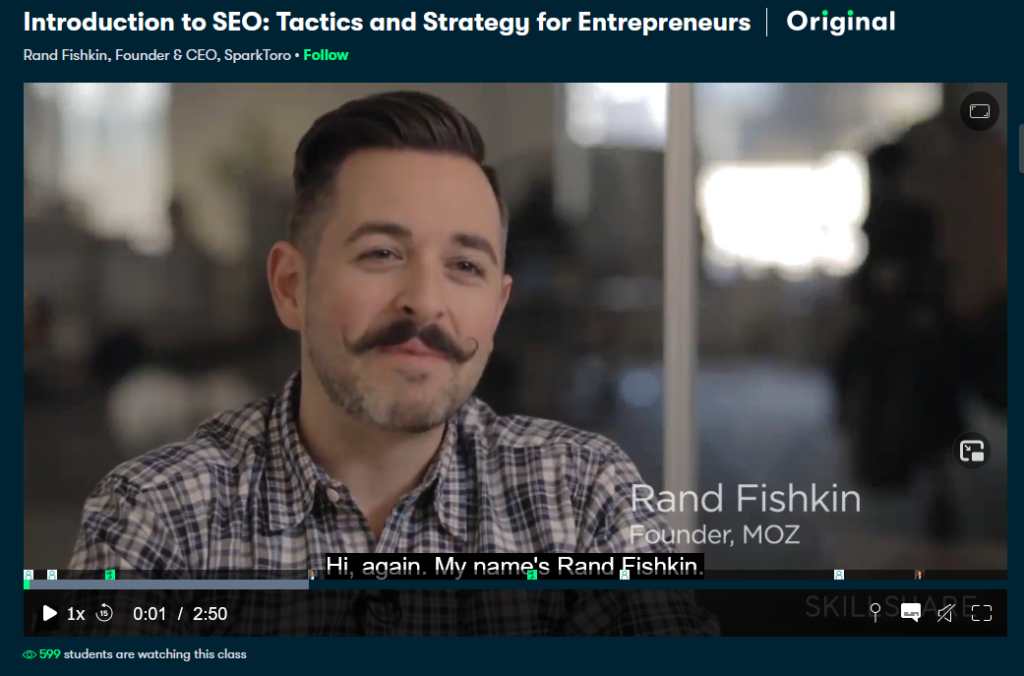
Then, chances are you’ll need to master tools to help you learn keywords, SEO tools like Semrush to learn what people are searching for, and how to optimize a site!
How much does SEO pay?
ZipRecruiter puts the average salary of an SEO consultant at $69,499, while a well-rated SEO consultant on Upwork can make anywhere from $60-250/hour. Not bad for a skill you can teach yourself.
2. Blockchain
Blockchain is a way of storing valuable information across a system in which each computer stores a record. It’s the basis for crypto — you know, the thing everyone was stoked about that tanked last year?
In non-computer speak, it’s simply that information is shared and duplicated across a system, making it harder to compromise, versus the model of storing information on a server that each computer accesses. Each computer has a record of any transactions, which makes it way safer than a centralized server. Get it?
As I write this, crypto has done a bit of a crash. But let’s be honest, the technology underlying cryptocurrencies and web 3 IS NOT going away. It will be a part of our lives, and if you’re an early adopter this high income skill set can pay off.
How to Learn
Blockchain is in high demand and continuing to grow. Because of this, there are a TON of courses and resources of there for learning, with many companies creating their own programming in a desperate bid to get more qualified workers.
Here are 7 free courses for learning Blockchain.
How much does Blockchain pay?
According to ZipRecruiter, a Blockchain software engineer earns an average of $139,952 in the U.S.
3. Data Science
Every day, there’s a ridiculous amount of data being produced. Companies use this data to try to understand their customers, how they shop, work, and live. And there’s so much data out there that they need people who can help them figure it out.
Enter… Data scientists.
A data scientist
Data science is the… um… the science of understanding data. (Was that too obvious?). Data scientists interpret. They tell stories. Basically, they help companies figure out what the mound of data they’re collecting means.
How to learn
There’s not just one road into data science. But there are a lot of data science skills that you can teach yourself and add to your resume. This DEFINITELY includes programming languages like Python and R, which anyone can learn thanks to handy-dandy platforms like Github.
We love Datacamp, which is an awesome online learning spot for all things data science. And they have a ton of free courses too.
How much does Data Science pay?
According to ZipRecruiter, a Data Scientist earns an average of $127,128/year in the U.S.
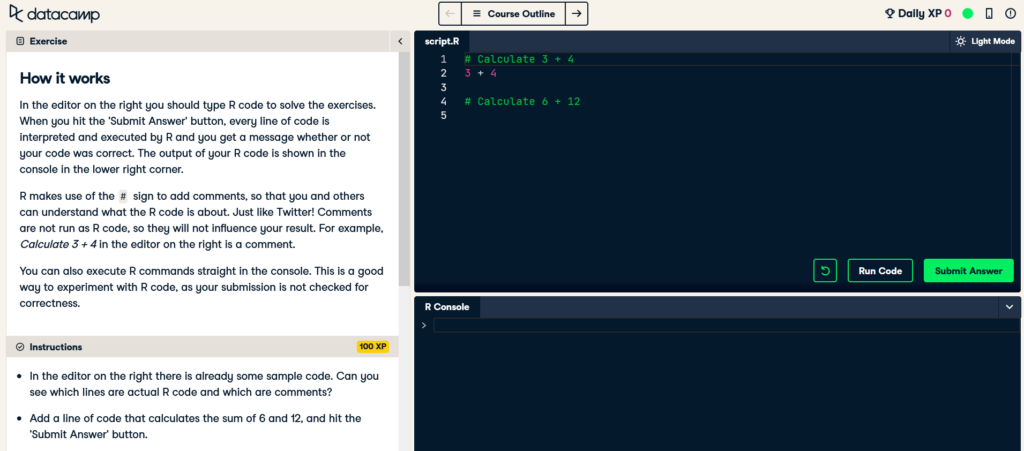
4. Machine Learning
Machine learning is a ridiculously in-demand skill right now. This is new on the list for this year, but artificial intelligence (AI) is making huge leaps and bounds. With new platforms like Chat GPT and Google Bard, AI skills are really in demand. And machine learning is one of those skills.
I did a quick search on LinkedIn and found 70,000 open jobs in Machine Learning in the U.S. And you know what’s incredible? They’re not just in tech. Health care. Banking. Consumer Services.
Machine learning is getting picked up everywhere as companies try to figure out how to apply AI to their existing data sets.
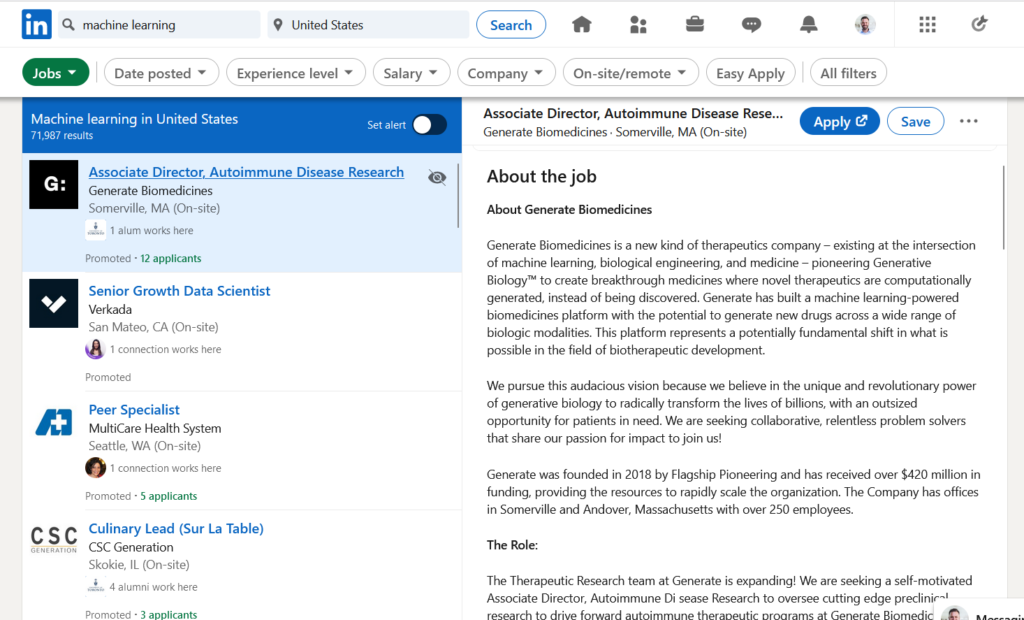
How to learn machine learning
I’ll be honest, learning machine learning is probably best for people who already have a baseline of technical skills. A lot of existing tech skills transfer really nicely into AI. Skills like coding and data science can lend themselves well to AI.
Machine learning can be stacked on top of these skill sets and becomes a SUPER high-income skill. Online platforms are playing catchup with ML courses, but there are some good ones out there already.
You can get started with machine learning on DataCamp!
How much does machine learning pay?
According to ZipRecruiter, a Machine Learning Engineer earns an average of $127,448/year. But it’s growing fast and there’s a lot of money to be made in AI right now.
5. Video Editing
I freaking love video editing… weird as that may sound. I get totally lost in creating something.
I made this video explaining how I make YouTube videos on my phone!
How to Learn
With phones now capable of making ridiculously high-quality videos. That means it’s not hard to become great at video editing. You can take your phone out today and start playing around. There are a few free video editing programs, I’ve used FilmMaker Pro.
But above all else, I love Adobe programs–which is what I’ve used for my videos. It’s easy to learn video production, and if you can do it well, nobody cares where you learned it.
How much does video editing pay?
Although a Video Editor’s salary on ZipRecruiter isn’t huge, $47,000 yearly, talented Video Editors on Upwork can make $40-150/hourly. This is good news for gifted video editors who want to work freelance, especially if you’ve got chops and the ability to market yourself. Video content is in high demand as companies try to get in front of digital audiences. You can even create a YouTube channel as a portfolio.
BTW- I have about $3,000 worth of pro camera gear. But lately, I’ve just been using my Samsung A50 with a DJI Mimo Gimble and a Lav Mic. While it’s not perfect, it’s quick, no-hassle, and I’m having fun learning. You can see my newest work here.
6. Social Media Marketing
Social media marketing is a BFD — a BIG FREAKING DEAL! And, to be honest, it’s not even fair to lump all the social platforms under one heading. Smart brands & companies know that each social media platform requires its own expertise. BUT for the purpose of this list, we’re sticking them together.
Digital marketing used to be the job companies gave to the intern. “Post this on Tweeter for us.” But no longer. Companies are throwing big budgets at digital marketing, recognizing that their online presence has the potential to overtake traditional marketing in the coming years—digital is now around 60% of all ad spends.
How to Learn
You can learn digital marketing. But, and I’m going to be honest here, building a following of 5,000 people on Instagram doesn’t cut it anymore.
If you’re serious about becoming a digital marketer, I’d recommend doing a deep dive on learning advertising across different platforms, Facebook and TikTok still seem to be the most popular. Learn Pixel, retargeting, and get serious about metrics and analytics.
Where do you do this? I found this fantastic list of free online marketing courses from HubSpot.. Which is an awesome place to start.
And, if you have that Skillshare account handy, try this course on Facebook ads!
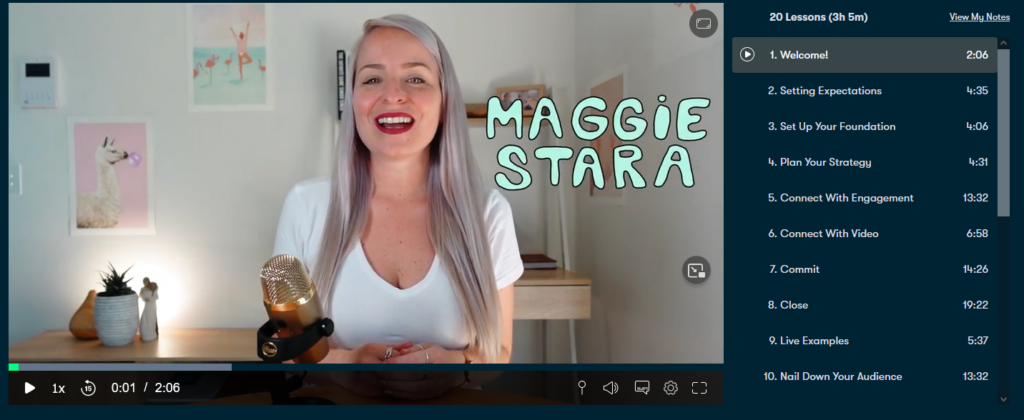
How much does social media marketing pay?
The national average for a Social Media Marketer is a bit lower-$64,375/year. But it’s still a decent salary. If you want to earn even more, niche down and specialize in things that directly connect to money for a company (e.g. Facebook ad campaigns).
7. Sales
Selling has been around for thousands of years. That makes sales the OG of high-income skills Unlike most of the other things on this list, it’s not fancy or sexy, and it’s not tech. But sales isn’t going anywhere. Companies need to sell things.

Sales IS changing though. Like everything else, it’s been upended by tech. From fancy AI customer databases to email lead generation software, sales will keep evolving. But at the base of sales is a relationship. As the famous saying goes, “people do business with people they know, like, and trust.”
Sales is the option on this list that has the greatest need for soft skills, as things like communication skills, collaboration skills, and interpersonal skills tie with sales skills to increase your earning potential.
How to Learn Sales
I’m not sure if everyone is cut out for sales, but if you think you might be, you can always improve your abilities. And don’t just assume that because you’re great with people you’ll be able to sell.
There are some fantastic courses on SkillShare, I really like this Modern Sales Training course. And there’s another list of Free Sales Courses here. Check it out!
How much does sales pay?
As far as the money goes, sales is a tough salary to pin down. After all, that pushy guy at the cellphone booth in the mall is a salesperson but might not make that much. But top salespeople can make multiple six-figures a year, actually, potentially more than any other job on this list.
8. Coding
It’s not surprising that coding is still a valuable skill, and it’s also something you can learn yourself. Developers are in high demand as we transition to a tech economy. And contrary to popular belief, you don’t have to have a computer science degree to be a developer.
Anyone can learn to code!
We talked about Data Science above — and yes, there’s some crossover here. Python and R are definitely coding languages. Software developers are still in high-demand, so mastering some of the high-income skills around software development and software engineering is a great idea.
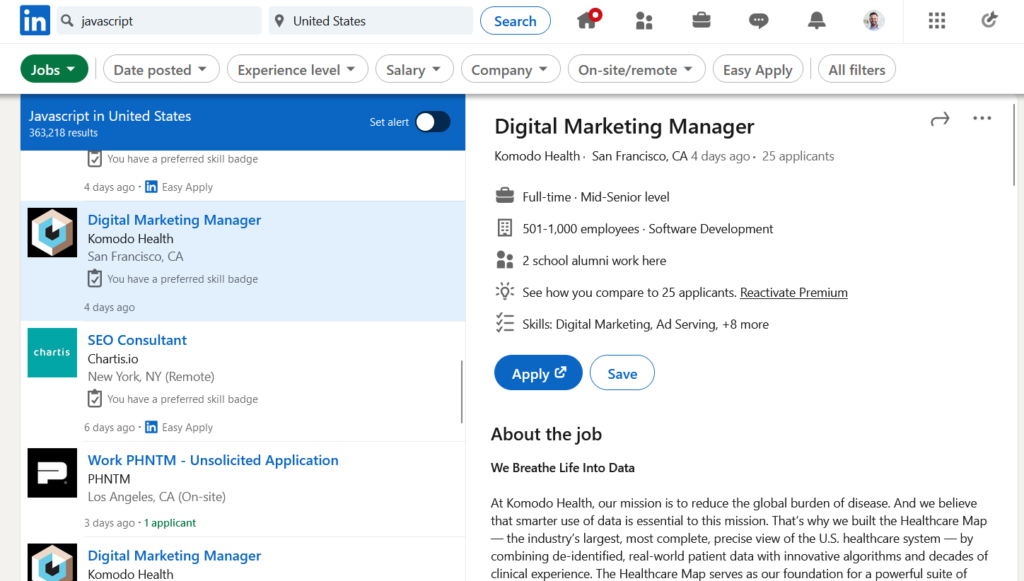
How to Learn Coding
There are so many free coding courses out there, particularly because everyone needs coders. Codecademy is a great place to start.
If you’re wondering what language to learn, it’s important to choose one that fits within your career goals. Do a search for some interesting jobs and see what languages come with it. If you search for an app developer role, for example, you’ll probably find languages like Java or Ruby on Rails are popular. Give it a try!
Here’s a cool Javascript course for beginners from UC Davis!
How much does coding pay?
A Java developer earns an average of $55/hr, while a Ruby developer earns an average of $125,500/year. You can check the average for whatever language you want to learn.
9. Copywriting
Are you a writer at heart? Have you always imagined living in a Starbucks, writing for a living?
Now imagine that life, but with a solid income.
Copywriting is the skill of using words to sell things, and it’s valuable. It’s one of those skills that a lot of people think they have, but few actually do.
It’s hard to write bulletproof prose that perfectly captures your ideal customer, stopping them in their tracks and helping them overcome objections to buy something. And that’s why companies pay.
Companies need copywriting for blog posts, content creation, and email marketing, not to mention landing pages.

If you want a taste of amazing copywriting, drop by Laura Belgray’s blog, Talking Shrimp. She’s one of the best copywriters around, and a read of her homepage will tell you why. I also love Eddie Shleyner’s blog, Very Good Copy.
Copywriting is about selling. But go read the best wordsmiths in the business, and you’ll see why they’re great. There’s none of that “But wait, there’s more” crap.
Just beautiful, crafted words that make you smile and fall in love with a mission or company.
How to Learn Copywriting
The blogs I mentioned above are a great place to start, and they have awesome resources. You’ll need to develop a portfolio, so writing copy should be a part of your learning. Reach out to local businesses or non-profits to see if you can practice for them. And keep a portfolio of your work!
And, if you’ve got that SkillShare account handy, there are some great copywriting courses here too. Start with Copywriting For Beginners: How To Write Web Copy That Sells Without Being Cheesy
And if you want to learn the art of wordsmithing, perhaps *ahem* reading should be part of it? Try some of these famous titles on for size:
Hey, Whipple, Squeeze This: The Classic Guide to Creating Great Ads, Luke Sullivan
Ogilvy on Advertising, David Ogilvy
How much does copywriting pay?
The average copywriter salary on ZipRecruiter is $59,084/year. But this is another one of those skills that will command you top dollar if you’re the best. Great copywriters are in high demand and charge a lot—the average copywriter salary on Upwork is around $100/hr.
10. User Experience (UX)
User Experience is a rapidly growing field, and it’s perfect for people with advanced degrees. It requires a mixture of qualitative and quantitative research. This means that most degree holders have some point of entry, but it’s an especially great choice for grads with social science and humanities degrees.
No matter what your degree field, US design professionals are still in demand and maybe it’s the place for you!
How to Learn UX
I found this little guide from Career Foundry for launching a career in UX, and it’s awesome!
If you happen to have a SkillShare membership, which I keep handy, there are also some great UX courses on there like Intro to UX: Fundamentals of Usability or User Experience Design Essentials – Adobe XD UI UX Design.
How much does UX pay?
Hold your breath, because UX Designers make an average of $98,816 in the U.S. UX Managers make $125,712 while UX Directors make $166,940. Who said you weren’t going to be able to use that anthropology degree? UX is the perfect place for it.
11. Project Management
Project Management is a bit of a catch-all title. Project Managers might do anything from designing a new road to overseeing a research project. So, if you want to move into project management, you’ll need to figure out what type you’d like to do. The type of projects that interest you.

How to Learn Project Management
It’s important to recognize that you might not be able to do every type of project management out there. If you’re a history grad, becoming a project manager is probably NEVER going to mean overseeing a bridge project.
So your goal is to figure out which domain you’d be applying project management skills in. You can do some free project management courses, there’s a good list here, to get a sense of the requirement and the discipline. You might even choose to invest in a PMP (Project Management Professional) certification, which is widely recognized. You can find more information about how to get certified here.
Google also has its own free Project Management training!
How much does project management pay?
The average project manager salary in the U.S. is $98,788/year, but with so many different types of project management make sure to check the specific industry you’re interested in.
12. Content Marketing
If you’re creative and love to write and/or edit, content marketing might be another skill for you. Unlike copywriting, content writing isn’t strictly designed to sell. Copywriting is a type of content.
But content is a much bigger bucket. When a company writes a blog post, its goal might not be immediately to sell… “get it now for a limited time!” In fact, its goal might be to educate, create brand awareness, inspire, tell stories, or any number of things.
For this site, content marketing includes SEO and copywriting — which I already talked about. But we also do a lot of video creation, as well as social media campaigns and scheduling. Digital platforms need all kinds of content, and business owners recognize that people who can create it are worth a premium.
For example, you can see here my posts scheduled for Facebook and LinkedIn for the past week on Roostervan’e social media scheduler.
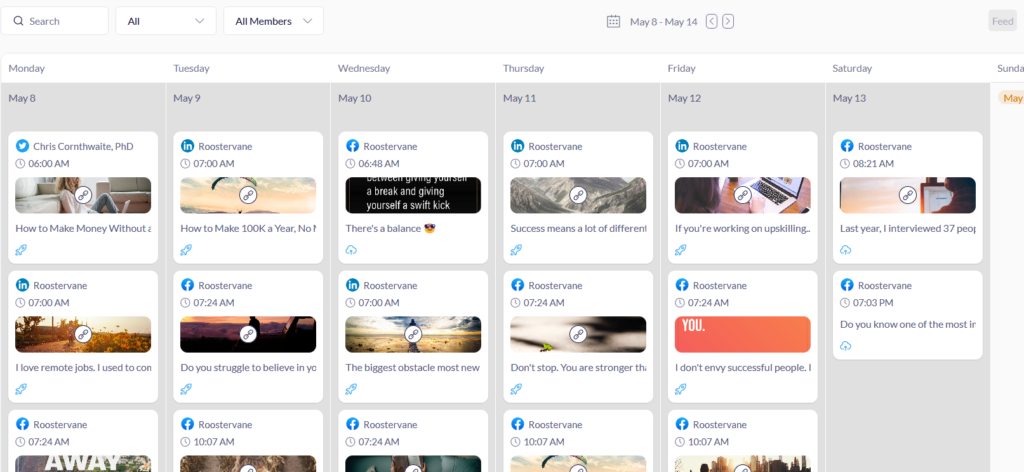
All this means that content marketing is a mixture of writing, images, video, social scheduling and strategy, and more!
If you love creating content and you get GOOD at it, you can get paid for it.
Of course, content creators can also work for themselves, monetizing their content with affiliate marketing, ads, paid promotions, etc. But I happen to think that for most people, working for others is a more realistic way to see higher income.
How to learn content marketing…
Write!
Okay, it’s not necessarily that straightforward.
But it is vital to find places to create content and hone your craft. I also found this course on SkillShare: Web Writing Secrets: Create Content That Captivates Your Audience , which I think covers some basics really well. Start finding avenues to write for, pitch content to blogs and magazines or start your own, and create a portfolio of your work to show potential employers.
Or start a blog! I would never have called myself a content writer when I put my first few thoughts down on this website. But as it turns out, I’m pretty damned good at this, and now I can make multiple six-figures consulting. One great way to cut your chops with content (and build your brand and make some money too) is to start your own blog.
I have a post here on How to start a blog and another one on How to make money blogging! And you can get started for like $2.95/mo on with your own blog on Bluehost — that’s the host I started Roostervane with.
How much does content marketing pay?
According to ZipRecruiter, Content Managers make an average salary of $63,000/year.
How to learn high-income skills (7 tips)
When I learned SEO, honestly, it was just for fun. I was creating this blog and figuring out what worked as I went. It turned into a project that I could share with people and–eventually–I could charge for this knowledge!
I’m not saying your journey needs to look like mine. You can be more strategic.
But let’s be honest, these skills are all possible to learn, but very few of the readers of this post will learn them.
Why?
Because it takes discipline and consistency. And not many people can pull that off. So I want to give you some tips for how to learn high-income skills… to make your chances of success REALISTIC! Here we go.
1. Start with an informational interview
Before you go gangbusters on any of these skills, start by finding someone–ANYONE–using them. If you can, have an informational interview with someone in this field to find out how it works, what they like and dislike about it, and if they recommend it.
2. Create a learning plan
Create a learning plan for approaching these high income skills. Figure out which classes you’ll take or which online platform will teach them.
Here are the online learning platforms I’ve already mentioned in this post:
3. Find accountability
Find someone who will keep you accountable for learning. It could mean joining a course that has other learners in it – a cohort course. It might mean asking a mentor, career coach, or even friend to hold you accountable. It’s unlikely you’ll finish this journey unless you start it well.
4. Build Projects
I can’t stress this enough. The ultimate way to make high income skills valuable is to build things that you can show off.
If you can show a boss an amazing app you coded, they won’t care where you went to school. If you can bootstrap a company with guerilla marketing, they won’t care if you have a marketing degree. The whole point of earning on a high income skill is to BRING ENORMOUS VALUE!
Building projects and portfolios show that you can deliver value!
5. Find a learning community
The cool thing about learning any of these skills is that you don’t need to do it solo. You can find active learning communities full of people working on them and job opportunities!
For example, if you want to learn marketing, search for “online marketing community.” You’ll find a ton of places you can pitch in and meet people doing marketing.
6. Get a paid training
If you can find an entry-level job or training opportunity for any one of these skills, you might get paid training! It’s great to learn these by yourself online, but it could be even better to get an employer to pay you to learn.
Search for jobs, paid internships, student programs, or other entry-level gigs to get paid to learn high income skills!
7. Become the best
I don’t really know any other way to say this. If you want to get paid well for any of these skills, you need to be the best. You need to be at the top of your game.
If you want a role where you can just phone it in and not really work, getting these high income skills won’t cut it.
All of them are high stakes and companies will expect a lot. If you become the best, you can command the most money. But if you aren’t going to be the best, don’t bother.
Checklist for high income skills 2023
In this post, we’ve given you some ideas for high income skills you can teach yourself. So the moment of truth. Here’s a checklist of the things you should look for when considering which high income skills to learn:
- Is it something you can learn relatively quickly, without going back to school?
- Can you find job postings on LinkedIn that require it (preferably with high salaries)?
- Are there people on platforms like Upwork looking for the skill?
- Will the skill help you make something you can show to potential employers or clients? (e.g. websites, portfolio, projects)
- Is it something you’re willing to take the time to learn by yourself?
Chances are, if you get most of these checked off, you’re looking at a high income skill!
Conclusion
If you feel like you’re stuck in your career, especially if you have a degree that feels useless or a dead-end job, why not learn one of these in-demand skills and level up? They’ll help you define the value you offer in the marketplace, and get paid more.
In fact, it was learning high income skills that took me past $20,000 a month, which was a milestone I frankly didn’t ever think I’d see. Yup, learning these skills can change your life.
Good luck!
Now Read:
14 Viable Passive Income Ideas for 2023
11 Perfect Side Jobs for Teachers
How to Make Money From Your Phone – 10 Ideas
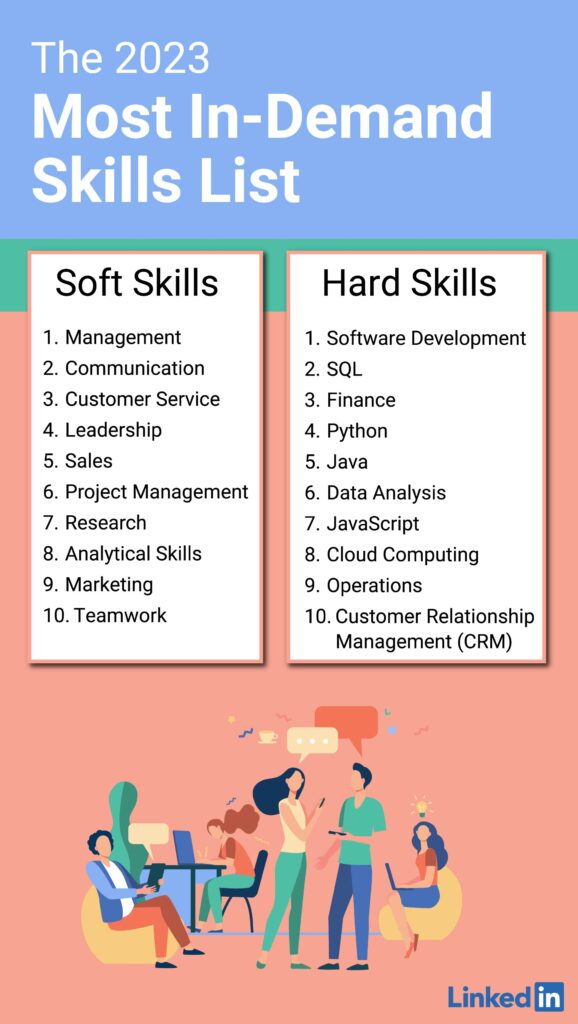

Updated May 14, 2023



